April 13, 2025 | 21:30 GMT +7
April 13, 2025 | 21:30 GMT +7
Hotline: 0913.378.918
April 13, 2025 | 21:30 GMT +7
Hotline: 0913.378.918
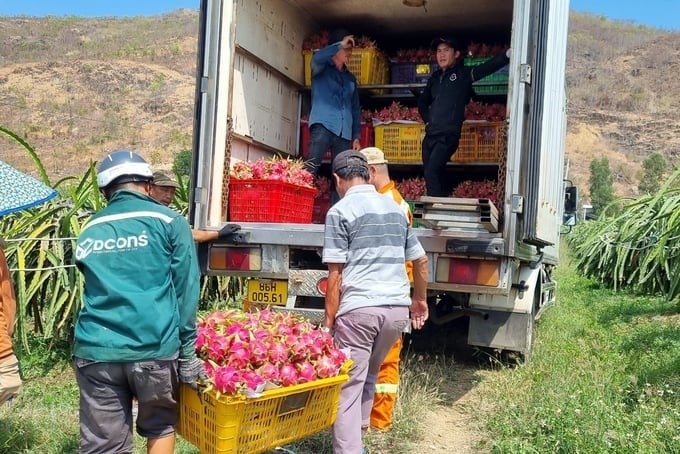
In the first 6 months of 2024, the consumption of Binh Thuan dragon fruit takes place smoothly, with high prices. Photo: Kim So.
In mid-July, in Binh Thuan province, the country's largest dragon fruit growing capital, farmers are very excited because the main dragon fruit crop is in peak harvest but prices still remain high.
Mr. Nguyen Tanh, owner of a dragon fruit garden in village 5, Ham Liem commune (Ham Thua Bac district), said that the price of white-fleshed dragon fruit is currently VND 12,000/kg, the highest compared to many recent years.
According to Mr. Tanh, every year the main dragon fruit crop begins harvest in April on the lunar calendar. This is a natural fruit-bearing crop with little investment in fertilizers and pesticides, so the price is only VND 3,000–4,000/kg. In previous years, the price of dragon fruit in the main crop was only VND 5,000–6,000/kg, even VND 2,000–3,000/kg at one point.
It is good that in the first 6 months of this year, dragon fruit prices were always high, reaching VND 25,000–30,000/kg at one point. Many farmers pay attention to taking care of and improving product quality to meet the market.
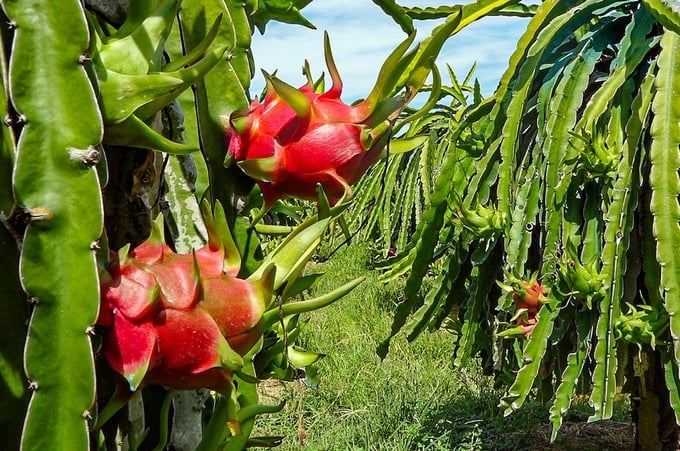
Binh Thuan is the country's dragon fruit farming capital. People mainly grow the white-fleshed variety. Photo: Kim So.
Mr. Nguyen Van Thanh's 4.5-ha dragon fruit garden in village 2, Ham Duc commune (Ham Thuan Bac district), was previously produced according to VietGAP standards. However, since 2023, he has continued to improve product quality by applying GlobalGAP dragon fruit farming processes to meet all demanding markets.
"Since producing GlobalGAP dragon fruits, the family has had a stable output with an average selling price of VND 24,000–26,000/kg at times of the year. In recent times, the company has signed contracts to purchase as much dragon fruit as the family produces to export to markets such as the US, Australia, and EU," Mr. Thanh said.
Similarly, Mr. Tran Dinh Trung, Chairman of the Board of Directors and Director of Thuan Tien Dragon Fruit Cooperative, Ham Liem commune (Ham Thuan Bac district), said that since the beginning of the year, the Cooperative's consumption of dragon fruit has taken place smoothly, with the signing of many consumption contracts with businesses exporting dragon fruits to the EU, US, and Australia markets.
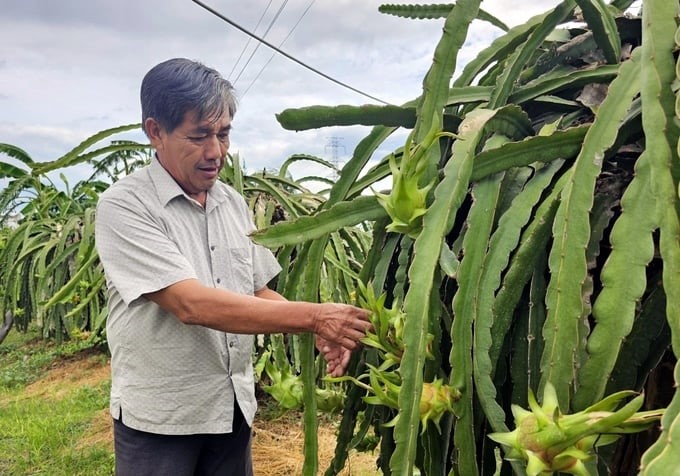
Mr. Tran Dinh Trung led us to visit the dragon fruit garden meeting GlobalGAP standards. Photo: Kim So.
According to Mr. Trung, the Cooperative now has 10 members and an area of 24 ha of dragon fruit. Of which, over 13 ha are grown according to GlobalGAP standards, and the rest is grown according to VietGAP standards. The total output reaches 400–450 tons/year. In addition, the Cooperative also links and entrusts consumption to Phu Thinh Dragon Fruit Cooperative, Thuan Hoa Dragon Fruit Cooperative, and Thuan Quy Dragon Fruit Cooperative, with an area of nearly 200 ha of dragon fruit that is also being produced according to VietGAP and GlobalGAP.
Leading us to visit the dragon fruit garden produced according to GlobalGAP standards, Mr. Trung shared that the farming process is followed very strictly by the Cooperative. For 10 years, the dragon fruit garden has not used herbicides. Fertilizers for plants are all organic, and biological preparations are used to prevent and control harmful organisms. The entire dragon fruit area is recorded in an electronic production log, ensuring product traceability. Thanks to that, the Cooperative's dragon fruit is guaranteed to have no toxic chemical residue, meeting the criteria and standards of export markets.
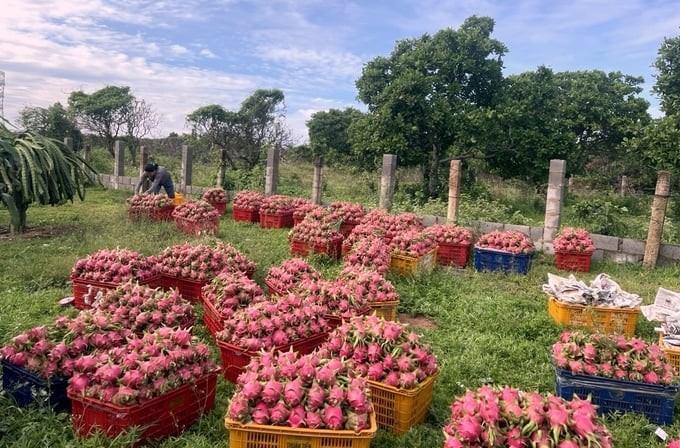
Binh Thuan farmers harvest dragon fruit. Photo: Kim So.
In recent times, Thuan Tien Dragon Fruit Cooperative has signed consumption contracts with a number of partners to export dragon fruits to the US, Australia, and US markets at a stable price of VND 23,000–24,000/kg. After deducting the costs of cleaning, packaging, management, etc., members will directly benefit from the remaining value of VND 19,000–21,000/kg.
Mr. Huynh Canh, Chairman of Binh Thuan Dragon Fruit Association, said that in the first 6 months of this year, the province's dragon fruit exports to foreign markets were stable. Not only China, Binh Thuan dragon fruit is shifting its exports to many markets, such as India, South Korea, Japan, Australia, Thailand, the Russian Federation, etc. This has helped keep the price of dragon fruit in recent times at a high, stable level.
According to Mr. Canh, from April to June this year, the price of white-fleshed dragon fruit was sometimes purchased by traders at a price of VND 25,000–30,000/kg, while the price of red-fleshed dragon fruit was about VND 40,000/kg. The reason for the sharp increase in price is due to a stable consumer market, while productivity and output of Binh Thuan dragon fruit decreased due to aging trees caused by drought.
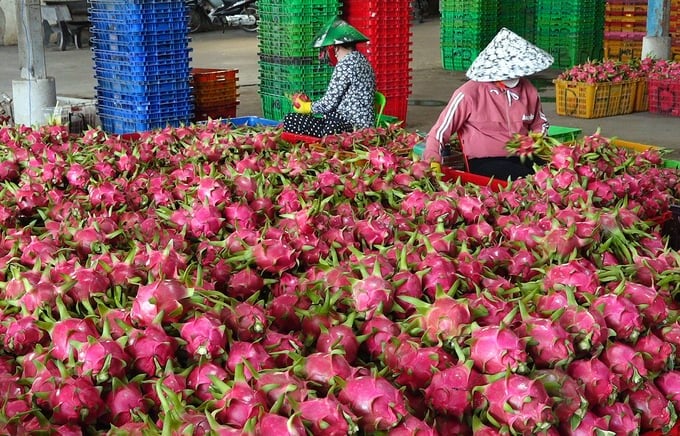
Binh Thuan dragon fruit is currently exported to many demanding markets. Photo: Kim So.
Since the beginning of July, the price of dragon fruit has dropped because it is in the peak harvest season, along with the competition from China's red-fleshed dragon fruit that begins to be harvested in large quantities. However, for GlobalGAP dragon fruit and clean dragon fruit, the selling price still remains high and stable when exported to many demanding markets.
"During the past two years, the price of dragon fruit produced according to GlobalGAP standards, without pesticide residue, has always remained at a high level of VND 20,000–35,000/kg," said Mr. Canh.
Mr. Phan Van Tan, Deputy Director of Binh Thuan Department of Agriculture and Rural Development, said that the agricultural sector orients farmers to produce according to VietGAP and GlobalGAP standards associated with production, processing, and consumption linkages along the value chain and environmental protection. At the same time, reorganize production and develop comprehensively and sustainably to improve quality, value, and maintain the "Binh Thuan Dragon Fruit" brand.
Besides, the province is focusing on consolidating and improving the operational capacity of cooperatives as well as mobilizing producers to participate in collective economic organizations. Thereby, promoting the role of cooperatives and cooperative groups in administering production, business, and building sustainable consumption channels.

Dragon fruits produced according to GlobalGAP standards have beautiful designs and quality. Photo: Kim So.
"In addition to strictly managing dragon fruit growing areas and packaging facilities that have been granted export codes, the agricultural sector will strictly handle the use of growing area codes and packaging facility codes that do not comply with regulations," shared Mr. Tan.
According to Mr. Bien Tan Tai, Deputy Director of Binh Thuan Department of Industry and Trade, the official export turnover of dragon fruit in the first 6 months of this year implemented by the province's businesses was estimated at USD 4.2 million, equivalent to 3,700 tons of fresh dragon fruit. According to data compiled from the Northern border provinces (Lang Son, Lao Cai, Ha Giang, and Quang Ninh), in the first 6 months of 2024, the amount of dragon fruit exported through the Northern border gates reached about 350,400 tons, mostly Binh Thuan dragon fruit.
Currently, the geographical indication "Binh Thuan Dragon Fruit" has been protected by the European Union (EU). Along with that, the "Binh Thuan Dragon Fruit" image and brand have been registered and agreed to be protected by 13 countries and territories, such as the US, UK, Germany, France, Netherlands, Japan, South Korea, China, Malaysia, Indonesia, Taiwan, Singapore, and Thailand.
Translated by Thu Huyen
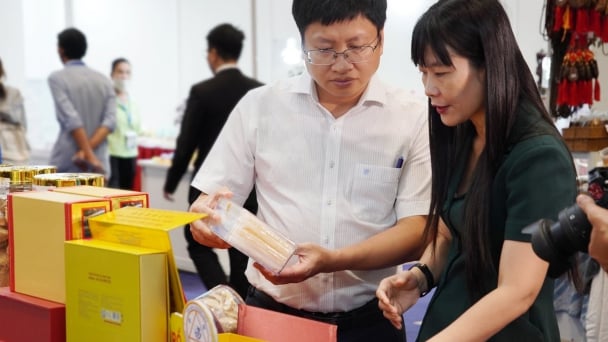
(VAN) KOCHAM Deputy President expects that Vietnam would accelerate innovation and development of bird’s nest-based products as a representation of Vietnamese culture.
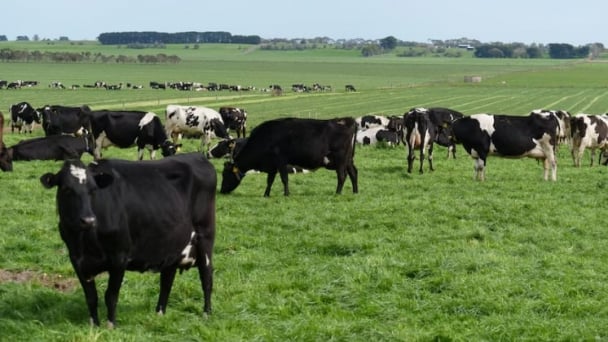
(VAN) Imported dairy products are weakening the local industry, according to dairy farmers and processors.
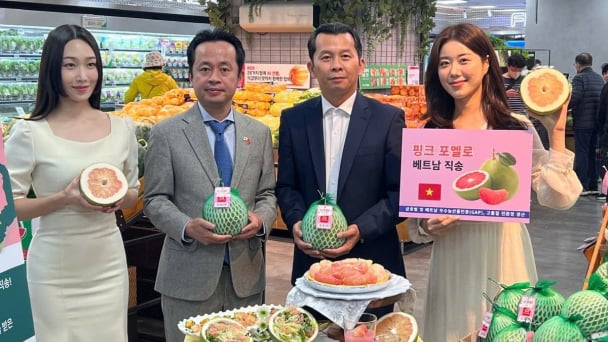
(VAN) April 10 marked a significant milestone for Vietnam's agricultural exports as Vietnamese pomelos officially became available at the Lotte Mart supermarket chain in South Korea.

(VAN) Vietnam is focusing on developing the legal framework and technical infrastructure for the carbon market, with committed support from global financial institutions.
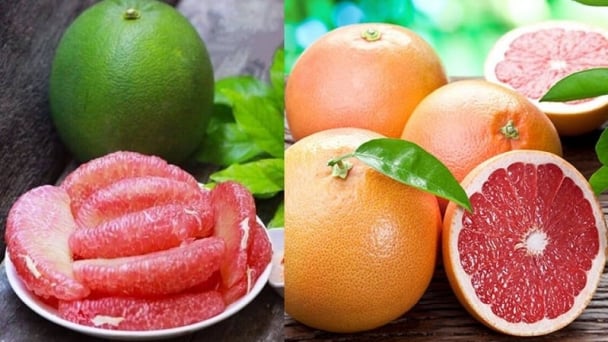
(VAN) The citrus fruits market in China is expected to slow down, but still show steady expansion, with volume reaching 56M tons and value reaching $71B by the end of 2035.
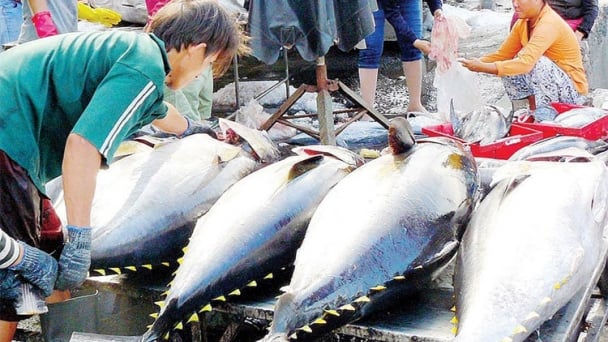
(VAN) The European Union issued a notice regarding the amendment of Annex III of Regulation (EC) No 853/2004 and aims to introduce new provisions in the fourth quarter of 2025.
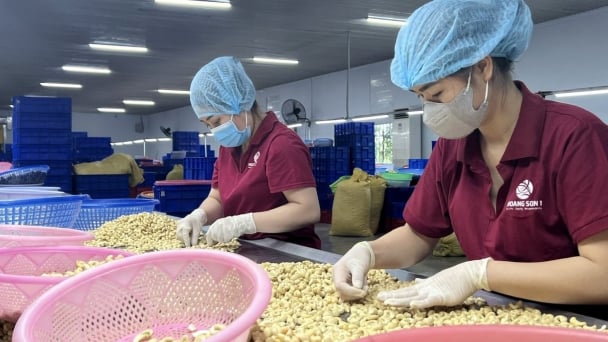
(VAN) Vietnam has great potential for exporting food to the global Halal market, but there is a need to build an ecosystem to develop this market.